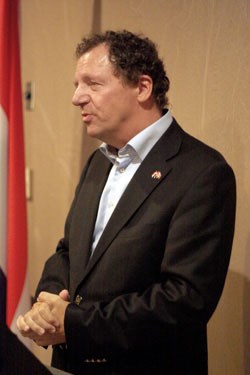The province of Saskatchewan, and Yorkton specifically, has resources and opportunities that are wanted around the world. Johannes Vervloed, Consul General for the Kingdom of the Netherlands was in Yorkton recently to explore opportunities for trade and cooperation between the city and his country.
One of the main focuses of the tour was canola, and part of the reason is due to regulations in the European Union surrounding fuel. The new regulations will see a requirement of ten per cent bio-fuel or other renewable sources for transportation fuel by 2020.
"We are very ambitious in the European Union, we want to be sustainable, we want to save energy, we want to use renewables and we also would like to be become a bio based economy, certainly in the Netherlands," Vervloed says.
The desire to move towards sustainable fuel sources is something that could see Yorkton and the Netherlands becoming very close in coming years, as they cannot produce the amount of bio-fuel that they need, Vervloed says.
While there are opportunities for trade, there are also some obstacles which need to be addressed, which is another part of the tour, Vervloed explains. Accompanying the delegation was Union Control, a logistics company familiar with the regulations in the European Union.
"Maybe we are too demanding, but we have a number of regimes, and you have to comply with the rules of those regimes in order to export to Europe. But again, we can offer you some help... There are obstacles, we are bureaucratic, but those obstacles can be overcome," Vervloed says.
There are lots of challenges in making bio-fuels profitable, Vervloed admits, but he says that the challenges can be overcome with cooperation between everyone, and that there will be a concentrated effort by both sides to make these opportunities work and make bio-fuel an important part of the relationship between Canada and the Netherlands moving forward.
"Let's work together, because what we ultimately have to do - and I emphasize "we" because we're in this together - is ensure that the production of the bio-fuel is done in a profitable basis, because otherwise it's not sustainable. So the byproducts have to be used, and be sold," Vervloed says.
The relationship between Canada and the Netherlands is a long standing one, and one which has been strong from the beginning. Vervloed says that Dutch immigrants have been and important part of the building of Saskatchewan, and he says that the Netherlands have never forgotten that Canada liberated the country in the second world war, and that the country continues to send 500,000 tulips to us every year in thanks. The Netherlands is also the second largest investor in Canada.
"I believe it is not only the business people, politicians and civil servants like me who should come together and do their job, but it's also the public at large. There is a strong bond between our countries, and we should be sharing the benefits of it with everybody," Vervloed says.




